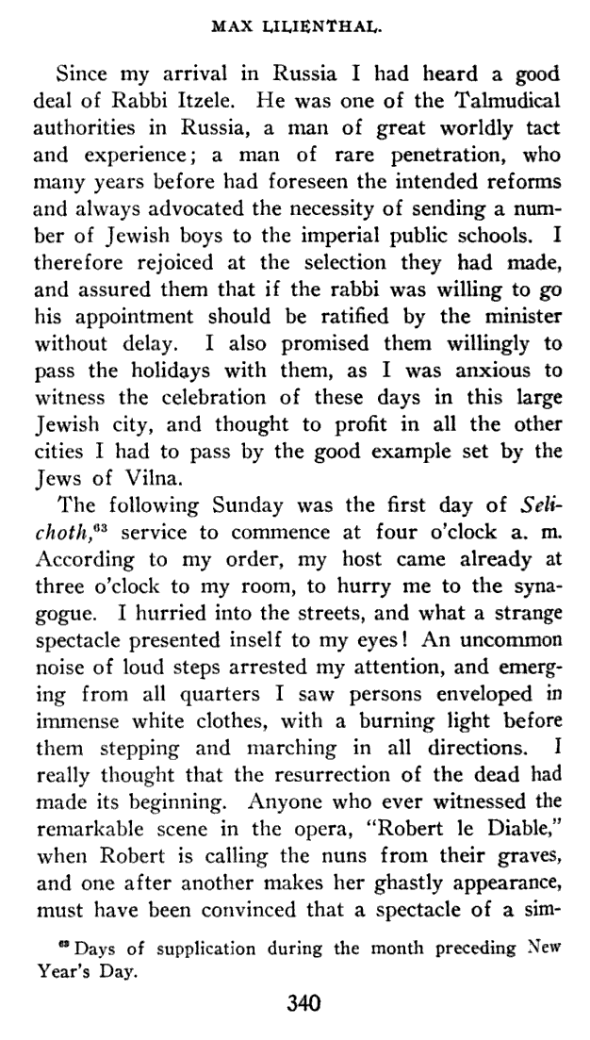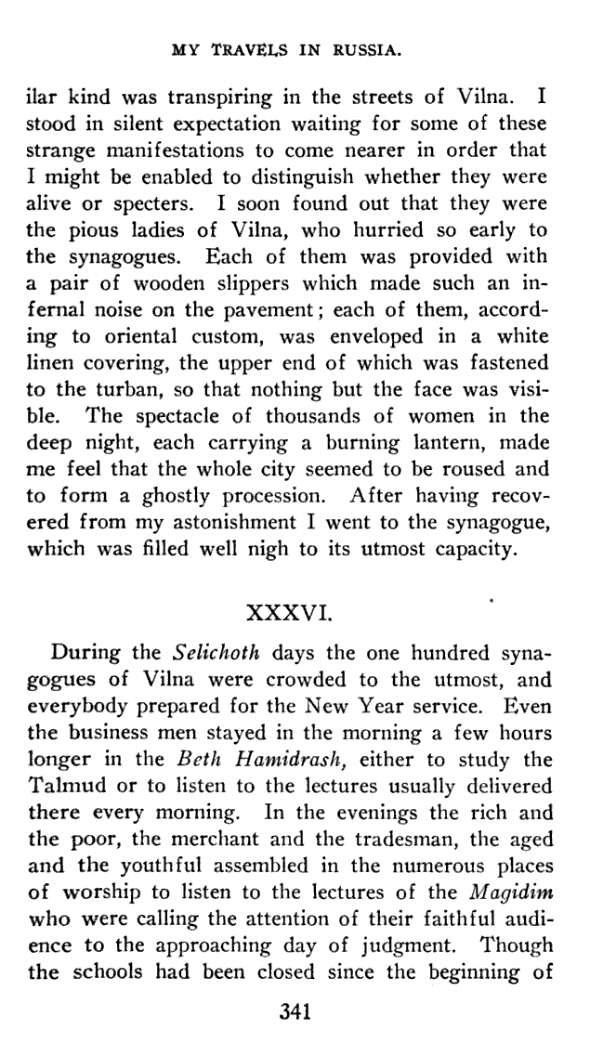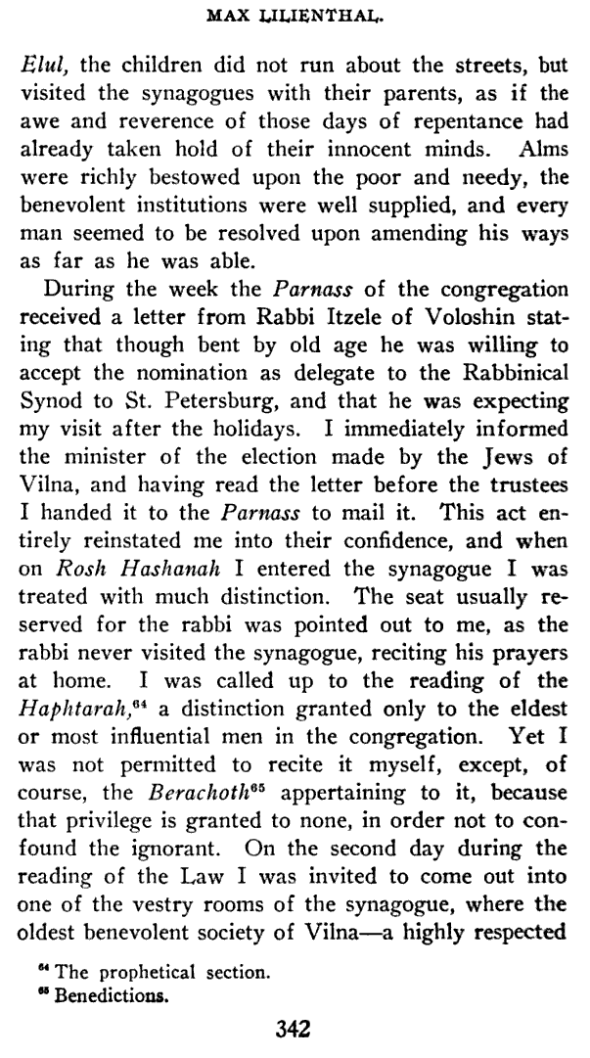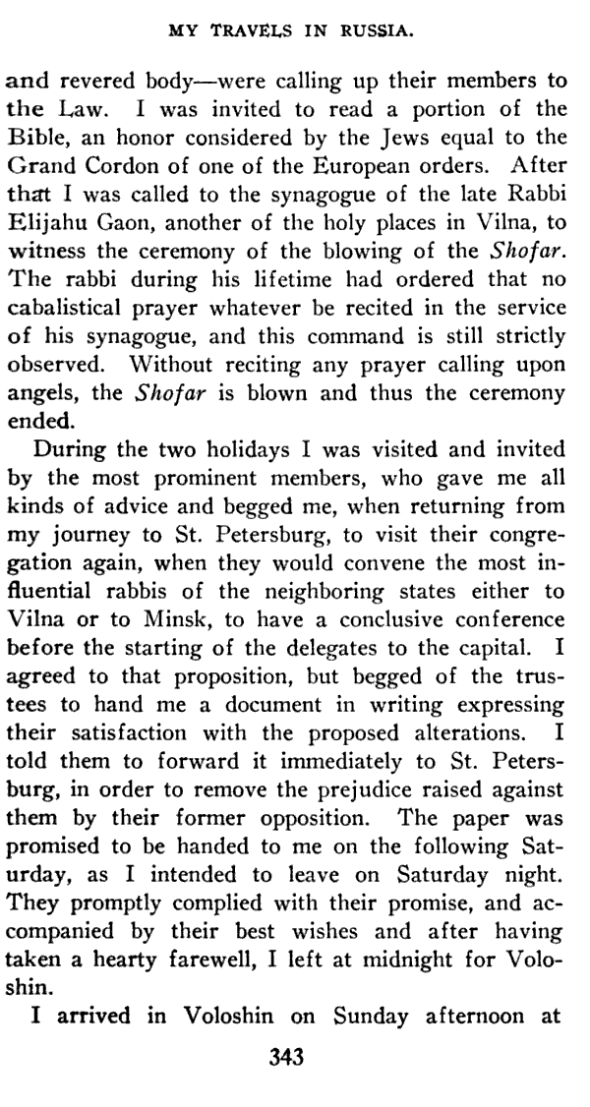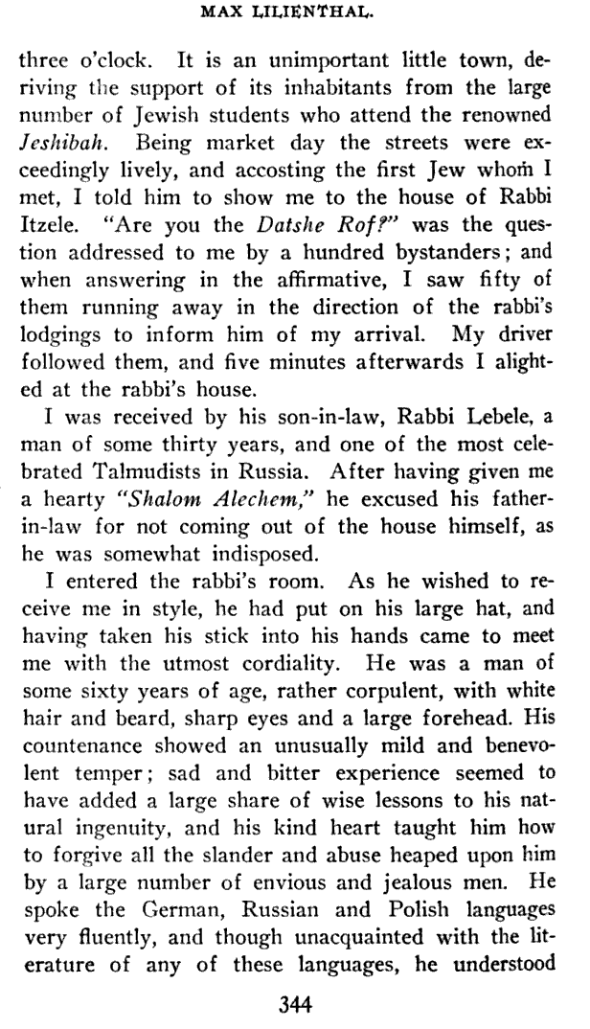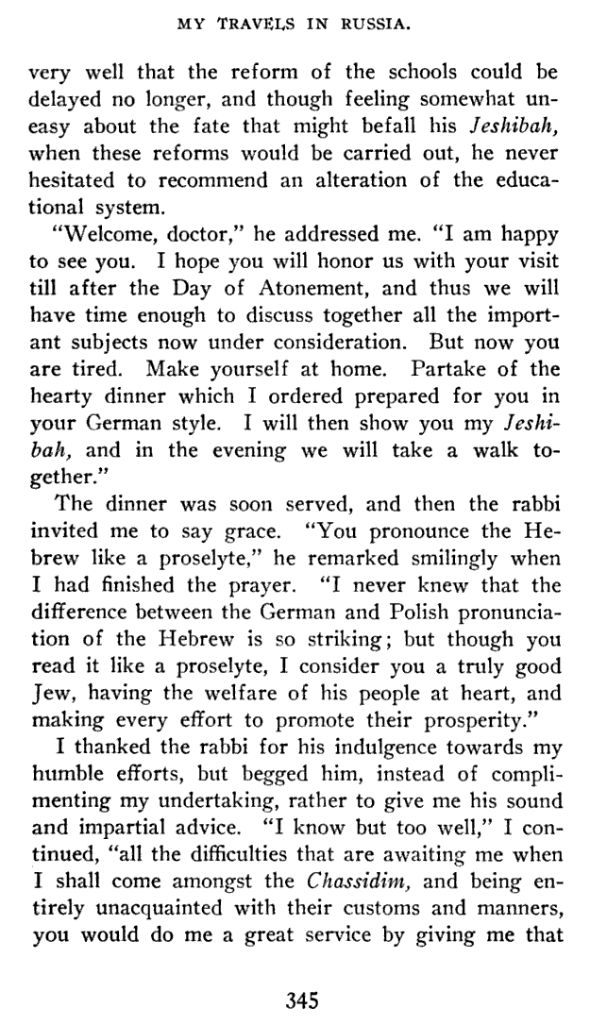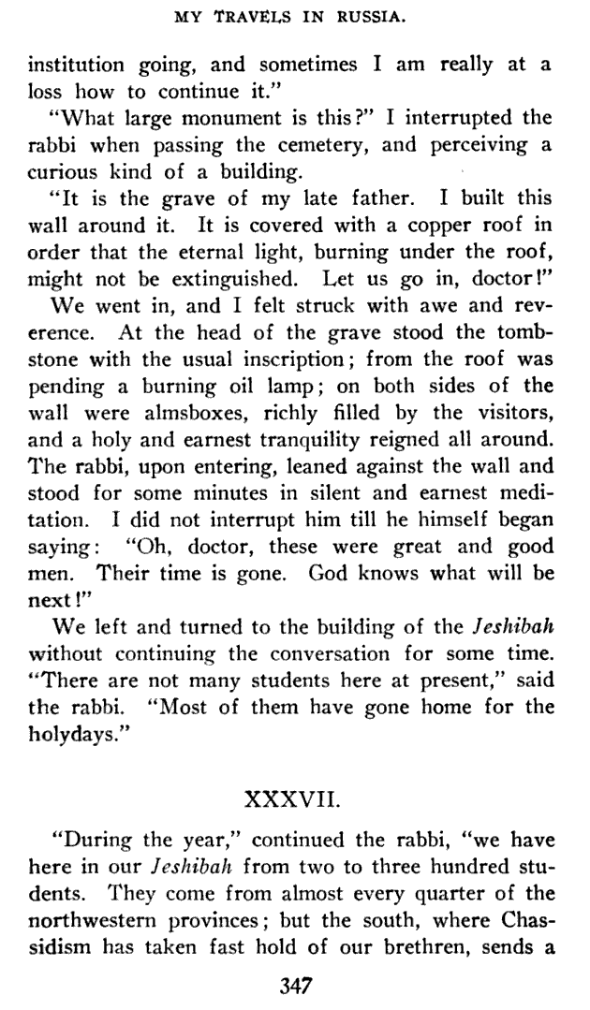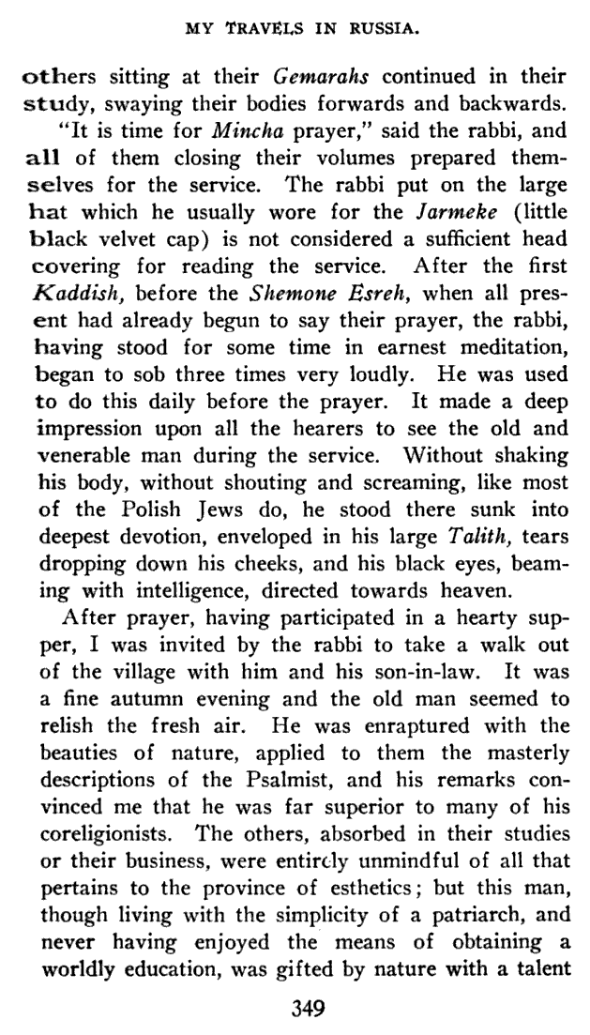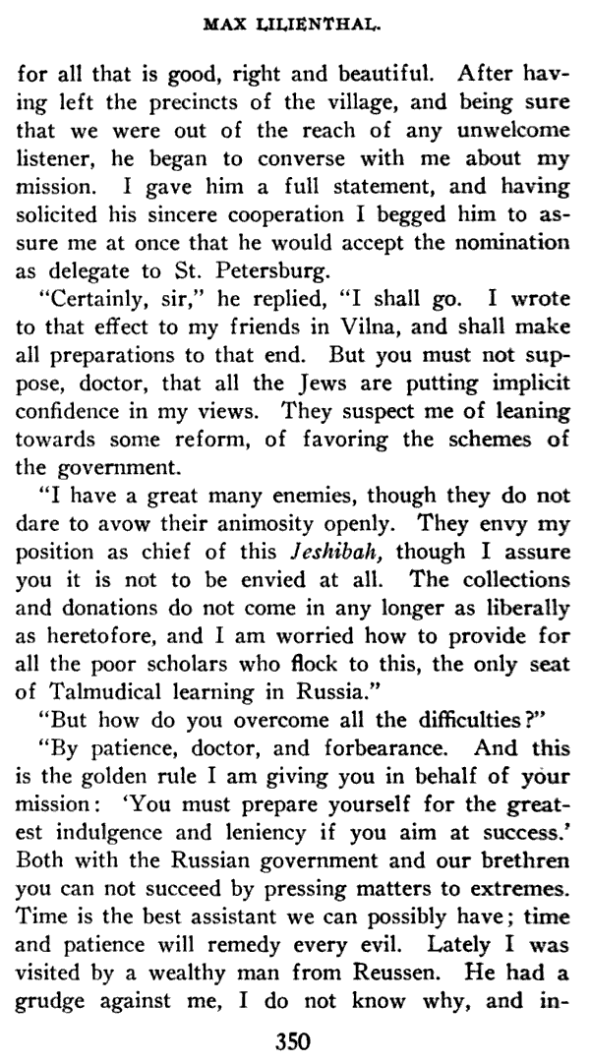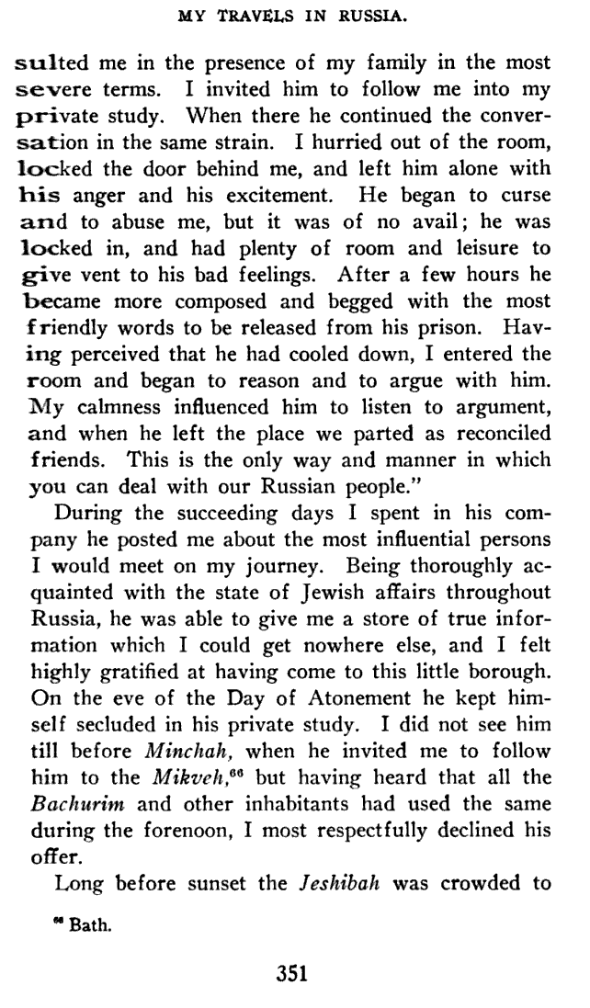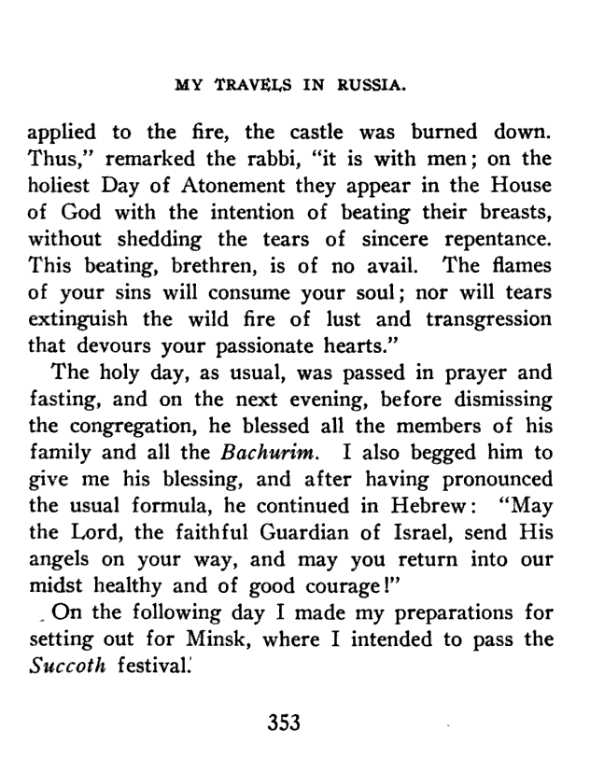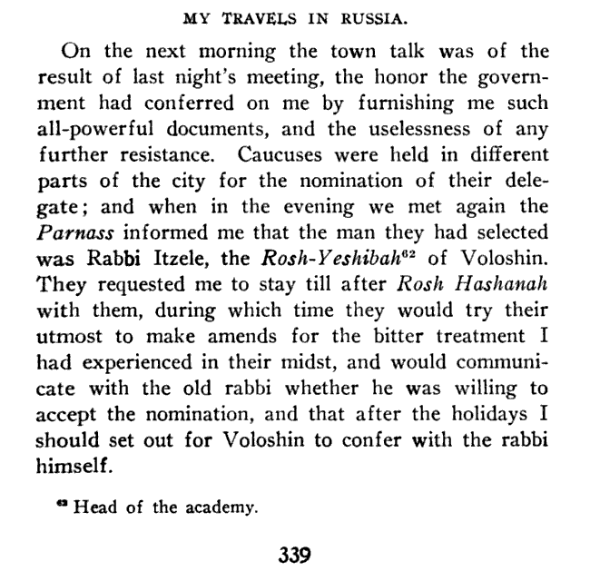I'm sure Max Lilienthal (1815-1882) needs no introduction, but for the purposes of this post, it's worth giving a brief explanation for what follows. Lilienthal was a young PhD who was appointed schoolmaster of a modern Jewish school in 1839. Given his talents and successes there, and a recommendation by Ludwig Philippson, editor of the Algemeine Zeitung des Judenthusm, the Russian government appointed him in 1840 to try to reform Jewish education and establish modern schools. Lilienthal was no dope and knew that this could only succeed if he could convince the rabbonim and rebbes to support it. For this purpose he undertook a trip to the traditional communities in Russia, to learn, listen and try to persuade.
He was unsuccessful, etc. His own official account is that he realized that the Russian government did not have the best interest of the Jews in mind. The "Making of a Godol account" is that while he subsequently gave this as the reason, in fact he was suspected of some illegal economic activities and had to depart Russia. I don't see these as mutually exclusive. Either way, he settled in the United States where he became an Orthodox rabbi - he really was exactly that, even organizing a Chevra Shas in his schul - although he soon began leaning toward Reform, eventually becoming one of the pioneering American Reform rabbis. See also Hyman Grinstein's article "The minute book of Lilienthal's union of German synagogues in New York " (HUCA 18, 1944).
In the mid 1850s he published an English translation of extracts from his diary of his travels in Russia in the newspaper the Israelite. These were reprinted in David Philipson's 1915 book Max Lilienthal, American Rabbi.
He was unsuccessful, etc. His own official account is that he realized that the Russian government did not have the best interest of the Jews in mind. The "Making of a Godol account" is that while he subsequently gave this as the reason, in fact he was suspected of some illegal economic activities and had to depart Russia. I don't see these as mutually exclusive. Either way, he settled in the United States where he became an Orthodox rabbi - he really was exactly that, even organizing a Chevra Shas in his schul - although he soon began leaning toward Reform, eventually becoming one of the pioneering American Reform rabbis. See also Hyman Grinstein's article "The minute book of Lilienthal's union of German synagogues in New York " (HUCA 18, 1944).
In the mid 1850s he published an English translation of extracts from his diary of his travels in Russia in the newspaper the Israelite. These were reprinted in David Philipson's 1915 book Max Lilienthal, American Rabbi.
Below are the passages concerning his meetings with R. Itzele Volozhiner, R. Chaim of Volozhin's son, rosh yeshiva of the famed Volozhin Yeshiva. The account is interesting for many reasons; it included his impressions of R. Itzele, and his son-in-law Reb Lebele (i.e., the 30-year old Neziv).
His description of the first day of Selichos is amazing. He was awoken at 3 AM for the Selichos which were to commence at 4 AM. In the street he witnessed a mass of women dressed in white, carrying lanterns through the streets of Vilna, to the synagogues.
He records that he was given maftir in the main (?) synagogue in Vilna - where he was seated in the absent rabbi's seat - but told not to read the haftarah himself. Lilienthal says that this was the practice so as not to embarrass anyone who couldn't read, but one wonders if it was because the haftarah was read on a klaf (handwritten, unvocalized parchment roll) as per the Gra (which is doubtful to me anyway). But if so, it really would be the same reason anyway ("not to confound the ignorant.") But of course it's strange to think that an unprepared Lilienthal could have read it from a klaf in the first place, and he implies that he would have read the haftarah if he had not been told not to. If they did read it on a klaf it seems a little odd that he didn't notice it or think to remark on it, so it probably wasn't read on a klaf at all. Another possibility, judging by a comment R. Itzele made about how he read Hebrew (see below), after reading the beracha and thus demonstrating how he recited Hebrew someone in charge decided that he shouldn't read the haftarah. However, the second day of Rosh Hashanah he was given an aliya in another minyan and asked to read the Torah, so it's probably like he said in the first place: only the ba'al keriah read the haftarah in the main synagogue so as not to "confound the ignorant." He visited the Gra's kloiz on the first day of Rosh Hashanah, and noted that the angels are not mention in the prayers related to the blowing of the shofar, as per the Vilna Gaon himself. Lilienthal seems to have taken this positively, seeing it as directed against superstition.
Upon arriving in Volozhin, he also was met with many ("a hundred") people for whom his reputation had preceded him. They asked him if he was the "Datsche Rof" (German rabbi). Here it might be appropriate to mention something I read recently in the first volume of Bialik's folklore journal Reshumos, but haven't seen quoted anywhere else. This concerns a later period, probably the 1860s. It seems there was a person named Mendele who was known as the Baal Gematrios, because he could quickly come up with a Gematriya for anything. One time Mendele walked into an inn and came upon a group of bareheaded Jews dressed in modern clothing eating and drinking. So he said to them, "Sholom Aleichem, Berliners!" One of them answered, "Aleichem Sholom, Karliner!" He thought for a second, and said that to the guy that he is right. The difference between a ברלינער and a קרלינער is כובע (a hat; Gematria is 98).
Getting back to Volozhin, other points of interest is that he quotes R. Itzele as telling him, after he has him recite the zimun, that he reads Hebrew "like a proselyte." For his part, Lilienthal thought he himself was reading it German-style. He also (famously at this point) quotes R. Itzele as explaining to him that in a typical morning in the yeshiva he gives a Chumash-Rashi shiur, in which he includes some of his own remarks and some things from the Mendelssohn Be'ur commentary. One wonders if this was true, or said to impress Lilienthal - but in a way it's a distinction without a difference. Kosher enough to tell him, is the point. As for whether it's a sheer fabrication on Lilienthal's part, that seems very unlikely, as all it did was serve to make R. Itzele seem a little bit enlightened, and what did Lilienthal gain, writing in his own diary - or in English in Ohio in 1856 - by fabricating this?
He also notes that R. Itzele invited him Erev Yom Kippur to join him at the mikva, which he declined.
